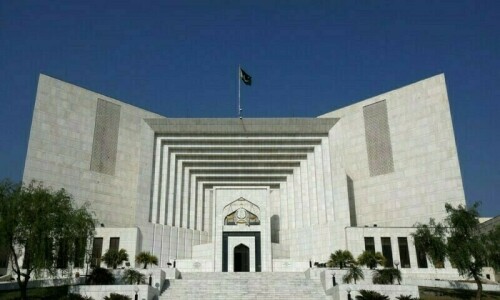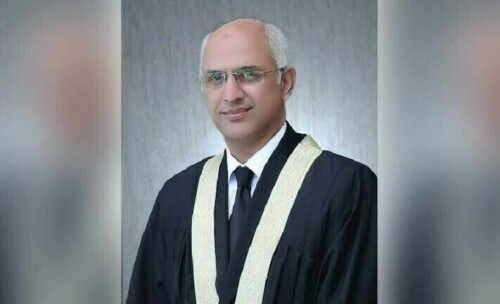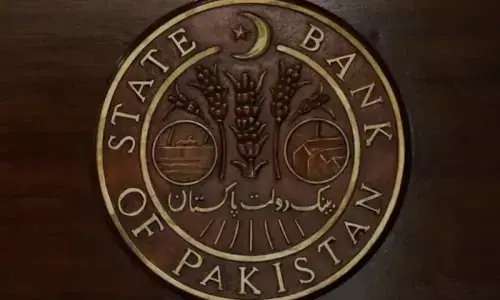ISLAMABAD: Justice Yahya Afridi has recused himself from a case pertaining to alleged meddling by the country’s security apparatus into judicial affairs, arguing that inaction on the part of the chief justice or judges of the Islamabad High Court should not lead the Supreme Court to impose the exercise of its jurisdiction under Article 184(3) of the Constitution.
“This may affect the functioning of the worthy chief justice and judges in their discharge of judicial functions, and would to my mind amount to interference in the independence of high courts,” said a note issued by Justice Afridi.
The note came after a seven-judge bench — led by Chief Justice of Pakistan Qazi Faez Isa and comprising Justices Syed Mansoor Ali Shah, Yahya Afridi, Jamal Khan Mandokhail, Athar Minallah, Musarrat Hilali and Naeem Akhtar Afghan — had on April 3 conducted the hearing initiated after six judges of the IHC wrote a letter to the Supreme Judicial Council (SJC) accusing the intelligence agencies of interfering in judicial affairs.
“To proceed on the proposed action of suo motu would negate the lessons moved into action by public sentiments no matter how pressing the issue may appear,” Justice Afridi emphasised, adding that one must also not ignore that the high courts under the Constitution were independent establishments envisaged to regulate not only their administrative functions, but also provide security to and safeguard the judicial officers in the discharge of their judicial functions.
“In the instant matter, none can doubt the bona fide of invoking suo motu jurisdiction under Article 184(3) of the Constitution, but when the letter of six worthy IHC judges craves for formulating the administrative course of conduct for serving judges to not only address any intrusion of the executive in their judicial functions, their mode and manner of interaction with the executive, to judicially proceed in the present proceedings would surely lead to an adverse spectacle — a sight should be avoided,” the note said.
It added: “None can dispute that the anxiety of six IHC judges’ March 25 letter most certainly warrants positive consideration, for inserting appropriate provisions to regulate the interaction of judges with the executive and the remedial response of the judiciary to any attempt or actual interference in its judicial functions in the Code of Conduct of judges of the superior judiciary, as provided under Article 209(8) of the Constitution.”
Culture of deviancy
On the other hand, Justice Athar Minallah, also a member of the seven-judge SC bench, regretted that no one has ever been held accountable for such an interference which has created impunity for the worst form of mutilation of independence of judiciary.
In his note, the judge said the public trust in the judicial system was eroded when the court’s suo motu arisen from high court judges’ letter suggests normalisation of the culture of deviancy.
“The onus is on the federal government to establish before the Supreme Court and to assist in resolving the questions raised,” Justice Minallah said, adding that instances mentioned by the high court judges in their letter were serious and their implications in the context of the independence of judiciary were grave.
“It also reflects a culture of accepting the practice of manipulation of judicial proceedings by the executive branch of the state through interference and intimidation,” bemoaned Justice Minallah, adding that institutional response relating to the most serious and grave acts of interference in judicial proceedings and intimidation of judges could be an acceptance of practices, standards and norms which have profound consequences for the independence of judiciary.
“The letter by the six judges, therefore, raises questions regarding institutional commitment to uphold the Constitution and the independence of the judiciary.”
Justice Minallah regretted that the phenomenon of interference with and manipulation of “politically consequential matters” has remained an acceptable norm which is manifested from the unflattering role of the judicial branch for the past 76 years.
“This phenomenon has, prima facie, relegated the principle of independence of judiciary to a mere platitude. This is what has been highlighted by the six judges in their letter,” Justice Minallah observed.
“The six judges have drawn the attention of the apex court to a matter which definitely is of paramount public importance, having profound consequences in the context of safeguarding the fundamental rights of the citizens.”
Justice Minallah was of the view that it was premature for the executive to constitute a commission and, prima facie, in breach determined on the judicial side having regard to safeguarding the independence of judiciary.
“The impunity against intimidation of the judges and interference in judicial proceedings in politically consequential matters cannot be denied, rather it has been affirmed by the Supreme Court repeatedly.
“The letter of six judges confirms that the cases of Asghar Khan and Dharna could not stop interference in judicial proceedings and that the judgements are being brazenly violated. The duties of the armed forces are clearly spelt out in the Constitution stating that they will under the direction of the federal government defend Pakistan against external aggression or threat of war, and, subject to law, act in aid of civil power when called upon to do so.
“We must not allow the honour due to those who lay down their lives for others to be undermined by the illegal actions of a few,” Justice Minallah highlighted, adding that the flagrant violations of fundamental rights of citizens and perceived failure of the courts to safeguard individual freedoms and rights severely undermines public confidence in the institution.
“The citizens would, therefore, be justified in raising questions regarding the independence of judicial. As judges of the highest constitutional court, we cannot turn a blind eye and ignore the grave abuse of powers by the executive which have consequences for individual freedoms and rights. We all know the reality but pretend to be ignorant,” the note said.
The SC order
The Supreme Court had in its April 3 order called for proposals from the main stakeholders in the judicial system and the independence of judiciary, namely the Pakistan Bar Council (PBC), Supreme Court Bar Association (SCBA), high courts and the federal government.
“They should suggest what should be the institutional response and mechanism to address the issues like the ones raised in the letter [of IHC judges] and ensure that such issues do not arise in future and, if they do, to fix liability and proceed against those responsible,” the order said.
In any such process, it added, the idea is to empower the high courts and their chief justices to deal with issues relating to the judges.
The court office was directed to issue the notice of this order to the PBC vice chairman, SCBA president, registrars of high courts and attorney general for Pakistan.
Since the matter involves questions as to the interpretation of constitutional law, which concern the federal government, the notices shall also be given to the AGP under rule 1 of Order 27A of the CPC, said the order.
The case will now be taken up on April 30.
Published in Dawn, April 13th, 2024

































